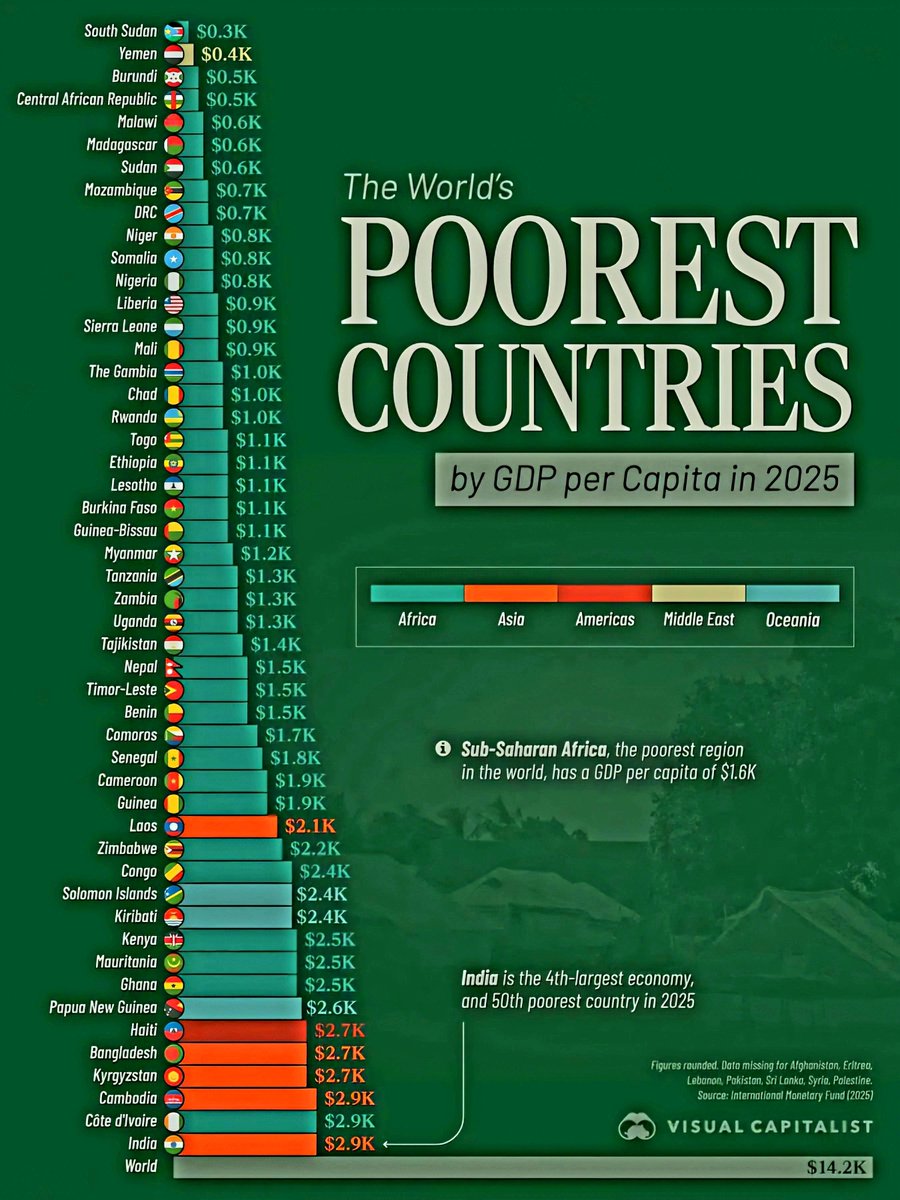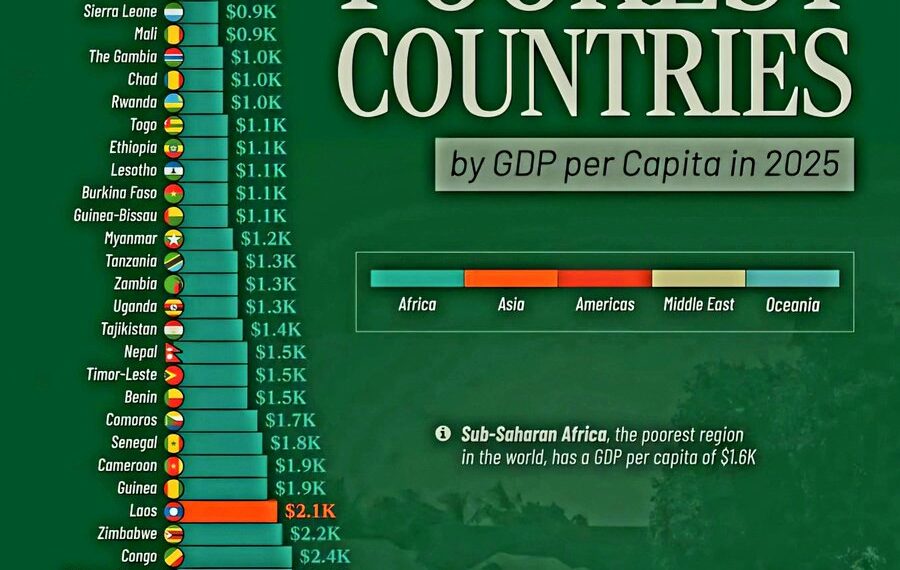Select Language:

In a world where economic metrics often dictate the quality of life, the International Monetary Fund (IMF) has released a disheartening list of the 50 poorest countries projected for the year 2025. This list highlights nations struggling with GDP per capita, shedding light on the urgent need for international aid, economic reform, and sustainable development. Here are the countries that made the list, along with insights into the challenges they face.
South Sudan – $300
At the bottom of the list, South Sudan tragically remains the poorest nation globally, with a GDP per capita of just $300. Years of conflict and instability have hindered any substantial economic growth, keeping a large portion of the population in extreme poverty.
Yemen – $400
Yemen, plagued by ongoing war and humanitarian crises, follows closely behind. Its GDP per capita is merely $400, underscoring the dire situation affecting its people, including widespread food insecurity and health crises.
Burundi – $500
Burundi, with a GDP per capita of $500, is facing numerous challenges including political strife and underdeveloped infrastructure. The country’s struggle to create job opportunities further exacerbates its poverty levels.
Central African Republic – $500
The Central African Republic also sees a GDP per capita of $500. Continuous conflicts and instability hinder economic activity, contributing to a humanitarian crisis that affects millions.
Malawi – $600
Malawi’s GDP per capita stands at $600. Despite efforts in agriculture, the country faces challenges due to climate change and inadequate access to education and healthcare.
Madagascar – $600
Madagascar shares the same GDP per capita as Malawi. The nation battles deforestation, social inequality, and economic vulnerabilities tied to its reliance on agriculture and tourism.
Sudan – $600
Sudan’s ongoing economic challenges result in a GDP per capita of $600. The legacy of conflict and political upheaval has left economic recovery in limbo.
Mozambique – $700
With a GDP per capita of $700, Mozambique faces a range of challenges, including natural disasters and limited access to healthcare and education.
DRC (Congo-Kinshasa) – $700
The Democratic Republic of Congo also shows a GDP per capita of $700. Despite its vast natural resources, ongoing conflicts and corruption continue to stifle economic development.
Niger – $800
Niger, with a GDP per capita of $800, deals with high poverty rates and food insecurity, largely linked to climatic variability that affects agricultural production.
Somalia – $800
Somalia shares a GDP per capita of $800, with enduring conflicts that inhibit stable governance and economic growth, leading to a cycle of poverty.
Nigeria – $800
Despite being Africa’s largest economy, Nigeria stands at $800 in GDP per capita due to significant income inequality and high levels of unemployment.
Liberia – $900
Liberia, still recovering from civil wars, has a GDP per capita of $900. The nation struggles with poor infrastructure and health systems, affecting economic productivity.
Sierra Leone – $900
Sierra Leone, with a GDP per capita of $900, faces challenges due to the aftermath of civil conflict and the ongoing battle against corruption.
Mali – $900
Mali, also placing at $900, is beset by political instability and ongoing terrorist activity, which hampers economic growth and development.
The Gambia – $1,000
The Gambia shows a GDP of $1,000 but struggles with limited economic diversification and high unemployment rates.
Chad – $1,000
Chad’s GDP per capita remains stagnant at $1,000, with issues stemming from poor governance and reliance on oil production.
Rwanda – $1,000
Rwanda, though often praised for its progress, still remains at $1,000 GDP per capita, facing the challenge of providing for its rapidly growing population.
Togo – $1,100
Togo’s GDP per capita of $1,100 reflects issues with governance and an economy that relies heavily on agriculture.
Ethiopia – $1,100
Ethiopia also registers a GDP per capita of $1,100, with climatic challenges impacting agriculture, a pivotal aspect of its economy.
Lesotho – $1,100
Lesotho’s economy, standing at $1,100, largely relies on remittances from citizens working abroad, leaving the local economy vulnerable.
Burkina Faso – $1,100
Burkina Faso, with a GDP per capita of $1,100, is grappling with social and political instability, which stifles economic growth.
Guinea-Bissau – $1,100
Guinea-Bissau faces similar challenges and is ranked with a GDP per capita of $1,100, struggling with political unrest and poor infrastructure.
Myanmar – $1,200
With emerging challenges, Myanmar sees a GDP per capita of $1,200 amid political turmoil following a military coup.
Tanzania – $1,300
Tanzania marks a GDP per capita of $1,300, but it also faces a broad range of development challenges tied to infrastructure and health services.
Zambia – $1,300
Zambia’s GDP per capita of $1,300 reflects its heavy dependence on copper mining, leaving it susceptible to global commodity price fluctuations.
Uganda – $1,300
Uganda, with a GDP of $1,300, is contending with issues around welfarism and sustainable development amid a youthful population demanding job opportunities.
Tajikistan – $1,400
Tajikistan reaches a GDP per capita of $1,400, where economic opportunities are limited, especially in rural areas.
Nepal – $1,500
With a GDP per capita of $1,500, Nepal continues to recover from political turmoil and natural disasters affecting its economic structures.
Timor-Leste – $1,500
Timor-Leste maintains a GDP per capita of $1,500 and still grapples with the effects of prolonged conflict on its infrastructure and economic growth.
Benin – $1,500
Benin’s GDP per capita remains at $1,500, facing challenges linked to agriculture and lack of access to essential services.
Comoros – $1,700
Comoros clocks in at $1,700, with an economy contingent upon agriculture but hindered by limited resources.
Senegal – $1,800
Senegal, with a GDP per capita of $1,800, is trying to diversify its economy towards tourism and fisheries but still faces poverty issues.
Cameroon – $1,900
Cameroon, having a GDP per capita of $1,900, is facing challenges tied to governance, infrastructure, and healthcare.
Guinea – $1,900
Guinea follows closely with the same GDP. Political instability and infrastructural challenges stifle its economic potential.
Laos – $2,100
Laos, at $2,100 per capita, is making strides towards development yet faces challenges in infrastructure and educational access.
Zimbabwe – $2,200
Economic mismanagement has led Zimbabwe to a GDP per capita of $2,200, despite having vast natural resources.
Republic of Congo – $2,400
The Republic of Congo, with GDP per capita at $2,400, battles corruption and conflicts that hinder growth.
Solomon Islands – $2,400
The Solomon Islands, also at $2,400, face challenges from climate change affecting agriculture and fisheries, the lifeblood of their economy.
Kiribati – $2,400
Kiribati, with a GDP of $2,400, deals with the impending threats of climate change that jeopardize its existence.
Kenya – $2,500
Kenya’s GDP per capita is $2,500 but faces growing inequality issues hindereding broad economic growth.
Mauritania – $2,500
Similarly, Mauritania reflects a GDP per capita of $2,500 as it struggles with governance and economic diversification.
Ghana – $2,500
Ghana, renowned for its resource wealth, also posts a GDP per capita of $2,500, wrestling with income inequality.
Papua New Guinea – $2,600
Papua New Guinea’s GDP reaches $2,600 despite rich natural resource deposits that could enhance its economic stability.
Haiti – $2,700
Haiti, still recovering from a series of disasters, registers a GDP per capita of $2,700, underscoring its ongoing economic struggles.
Bangladesh – $2,700
With a similar GDP, Bangladesh shows substantial progress in some sectors, but still has a long way to address poverty.
Kyrgyzstan – $2,700
Kyrgyzstan also sees a GDP per capita of $2,700, grappling with political instability and limited economic opportunities.
Cambodia – $2,900
Cambodia ranks just under $3,000, focusing on tourism and textiles but needs to diversify its economy for growth.
Côte d’Ivoire – $2,900
Côte d’Ivoire, at $2,900, showcases growth potential amidst challenges such as political instability affecting economic opportunities.
India – $2,900
While India is projected to be the 4th largest economy, it still ranks as the 50th poorest country globally with a GDP per capita of $2,900, reflecting stark inequalities.
In conclusion, the harsh realities highlighted by this list reveal a compelling narrative of economic struggle, the constant pursuit of stability, and the vision for a better future. Urgent action is required to address the structural issues plaguing these nations with a focus on sustainable economic growth and community empowerment. The global community must unite in efforts to provide the necessary support and create a roadmap for development in these regions.





